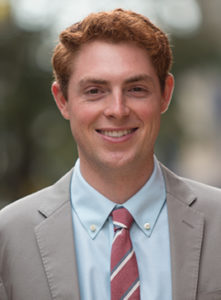


Sean Hansen comes to the USGLC after working on Capitol Hill in the office of Rep. Adam Kinzinger, where he assisted on foreign policy issues. Prior to that, he served as Policy Intern at the USGLC. Sean’s interest in international affairs developed from summers spent sailing the world aboard an 18th century replica tall-ship, the HMS Bounty. He holds a bachelor’s degree in international relations from the State University of New York at Geneseo, where he specialized in conflict resolution and U.S. foreign policy, and is currently pursuing a graduate degree in international development at Johns Hopkins University’s School of Advanced International Studies. Sean is a proud Long Islander, hailing from Setauket, NY.
Secretary Pompeo recently wrapped up his first month at the State Department with the launch of the 2017 Report on International Religious Freedom — part of his first signature policy initiative at the State Department. In releasing the report, Secretary Pompeo emphasized that “Advancing liberty and religious freedom advances America’s interests,” and that “religious freedom deserves to be a front-burner issue.”
This week, the Democratic Republic of Congo (DRC) announced that a deadly new outbreak of Ebola has spread to Mbandaka, a large city in the DRC with a population of over one million. As news of the outbreak spread, the White House announced its intention to rescind approximately $252 million in U.S. funding for the fight against Ebola.
Vice President Mike Pence will represent the United States at the Eighth Summit of the Americas in Peru this weekend. The trip takes place against the backdrop of a host of policy challenges in the region, including economic disputes, concerns about illicit drug flows, and a humanitarian crisis. Here are some key opportunities and challenges that should be top of mind for the Vice President as he touches down in Lima:
Recognizing how difficult it can be to predict epidemics, the World Health Organization recently declared that the unknown “Disease X” is likely the most deadly infectious disease facing the public today. Considering that it takes just 36 hours for deadly pathogens to spread anywhere in the world, “Disease X” could prove even more devastating than the recent Ebola and Zika outbreaks.
In El Salvador, Lula Mena’s hand-made jewelry business is thriving. Thanks to critical business training and export assistance from the U.S. Agency for International Development (USAID), Lula now exports her goods to eight countries. But the impact of Lula’s success extends far beyond her own family.
At the heart of USAID Administrator Mark Green’s vision for the agency is “to end the need for its existence,” and a desire to transition countries that may no longer need development assistance to a new relationship with the United States. But against the backdrop of the proposed 32% cut to the International Affairs Budget, there have been some concerns that “transitions” could serve as a cover for cutting aid budgets and closing missions.
Last month, former presidential candidate and liberal icon Senator Bernie Sanders (I-VT) traveled to America’s heartland to lay out his vision of a progressive foreign policy. Speaking at Westminster College in Fulton, Missouri, Sanders’ hour-long speech outlining how he views America’s role in the world was the most comprehensive of his career to date.
During Vice President Pence’s recent trip to Latin America, he commented on the situation in Venezuela by saying “we’re seeing the tragedy of tyranny play out before our eyes.” In his speech, Pence highlighted the sharp contrast between the U.S. allies and partners he visited – such as Colombia – with the increasingly isolated Venezuela.
Congress will soon determine the levels of U.S. assistance available to Mosul and other global humanitarian crises. Rebuilding Mosul will be a critical test and an enormous challenge, yet the future of Iraq— and the future of America’s presence abroad— may well depend on what emerges from the city’s rubble.
After sailing through his nomination hearing with strong bipartisan support, senators on the Foreign Relations Committee and other development leaders have called for a speedy confirmation for Ambassador Mark Green as the 18th Administrator for the U.S. Agency for International Development. While he will face a host of other challenges— including the largest humanitarian crisis since World War II, and a budget proposal that seeks drastic cuts to USAID— he remains hopeful about the opportunities and improvements that have been made at the agency.
Get the latest news, advocacy, and event updates from the USGLC
Copyright 2024 USGLC | Privacy Policy
Notifications